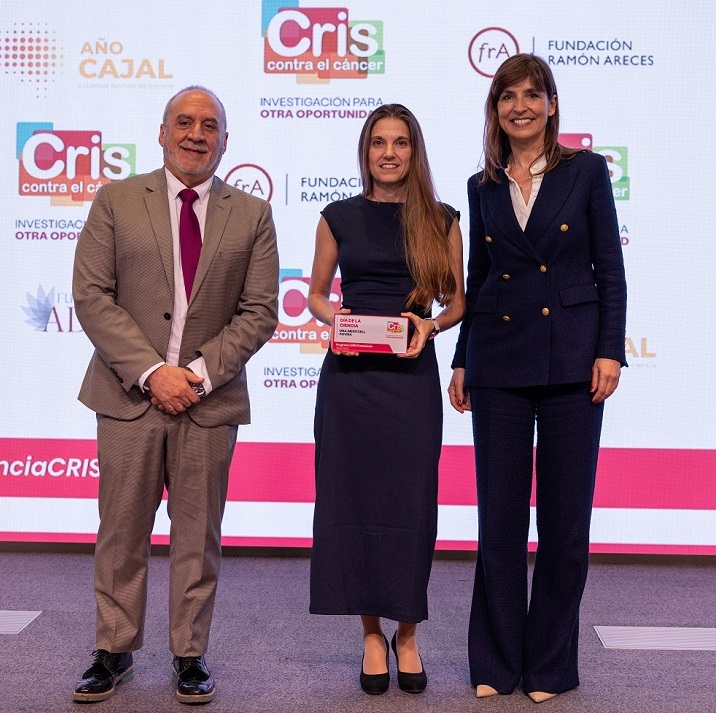Researcher Meritxell Rovira, winner of the CRIS Excellence Award for her study of pancreatic cancer

Meritxell Rovira, leader of the Pancreatic Regeneration research group at the University of Barcelona and the Bellvitge Biomedical Research Institute (IDIBELL), has received the CRIS Excellence Award 2023 from the Cris Cancer Foundation, a non-profit organization whose aim is to raise funds for cancer research. Her project will examine the cellular heterogeneity of the pancreas to better understand the development of pancreatic ductal carcinoma (PDAC), a disease with a five-year survival rate below 10% and without early detection methods or effective treatments.

Meritxell Rovira, leader of the Pancreatic Regeneration research group at the University of Barcelona and the Bellvitge Biomedical Research Institute (IDIBELL), has received the CRIS Excellence Award 2023 from the Cris Cancer Foundation, a non-profit organization whose aim is to raise funds for cancer research. Her project will examine the cellular heterogeneity of the pancreas to better understand the development of pancreatic ductal carcinoma (PDAC), a disease with a five-year survival rate below 10% and without early detection methods or effective treatments.
The award ceremony was held yesterday in Madrid, in the scientific symposium held on CRIS Science Day 2024, under the slogan “Drawing the future of cancer: Transforming cancer detection with advanced technologies”. Among other authorities, the Spanish Minister of Health, Monica Garcia, and the President of the CRIS Cancer Foundation, Lola Manterola, participated in the event, as well as national and international experts of international prestige.
“Receiving this support from the CRIS Cancer Foundation is a great honour”, said Meritxell Rovira, who received the award from the Secretary of State for Science, Innovation and Universities, Juan Cruz. “This funding offers me the opportunity to carry out an ambitious project with the potential to change the prognosis of a disease that, unfortunately, currently has a very negative impact on the people who are diagnosed with it”, says Rovira, who specializes in cell lineages and pancreatic cancer and is also a Ramón y Cajal researcher at the UB’s Faculty of Medicine and Health Sciences.
The CRIS Excellence Programme, which awards a grant of up to 1,250,000 euros for a five-year project, also distinguished the expert César Serrano, from the Vall d’Hebron Institute of Oncology (VHIO).
Not all pancreatic cancers are the same
Understanding how PDAC, a subtype of pancreatic cancer, starts is essential to find better ways to treat it. Meritxell Rovira’s team has recently discovered that tumours originate from different types of cells, which may explain why some tumours are more aggressive than others. Now, IDIBELL and UB researchers will deepen this analysis to find new genes that can help detect and treat pancreatic cancer more effectively.
Using state-of-the-art genomic techniques, scientists will analyse pancreatic samples from both mice and human patients. These data will be compared with clinical data and information on tumour progression to identify specific early diagnostic biomarkers and potential new therapeutic strategies, offering hope to patients and their families. “This aims to fill the main gap in the detection and treatment of PDAC to have a positive impact on the clinical setting”, says Rovira.
Meritxell Rovira graduated in Biology at the UB and plans to major in pancreatic development. During her career, she has conducted pioneering research on embryonic stem cell differentiation and its relationship with cancer, a scientific trajectory that has led to significant publications. Since 2019, she leads the Pancreatic Regeneration laboratory of IDIBELL and UB, which has gained recognition and funding. She has also received prestigious awards such as the L’Oréal-UNESCO award or a CaixaResearch grant for Health Research from La Caixa Foundation.
A progress engine in oncology research
The CRIS Foundation aims to ensure that everyone has access to the most advanced treatments in a fair and equitable manner. In particular, the CRIS Research 2023 Programmes aim to advance career research, and to support researchers and projects of excellence with exceptional funding.
Since its creation thirteen years ago, the foundation has invested fifty million euros, thirty-nine million of which in the past five years alone. In addition, it has pledged to reach an investment of eighty million euros over the next five years. Globally, more than 7,700 patients directly benefit from CRIS-supported clinical trials, and research advances are expected to benefit up to eleven million potential patients.
“At the CRIS Cancer Foundation we work to cure cancer through research so that all patients have another chance. If we all work together, state and regional governments, civil society, increase investment in research and development and promote public-private collaboration, we will succeed in finding solutions that cure cancer”, concludes its president, Lola Manterola.
Multimedia gallery

